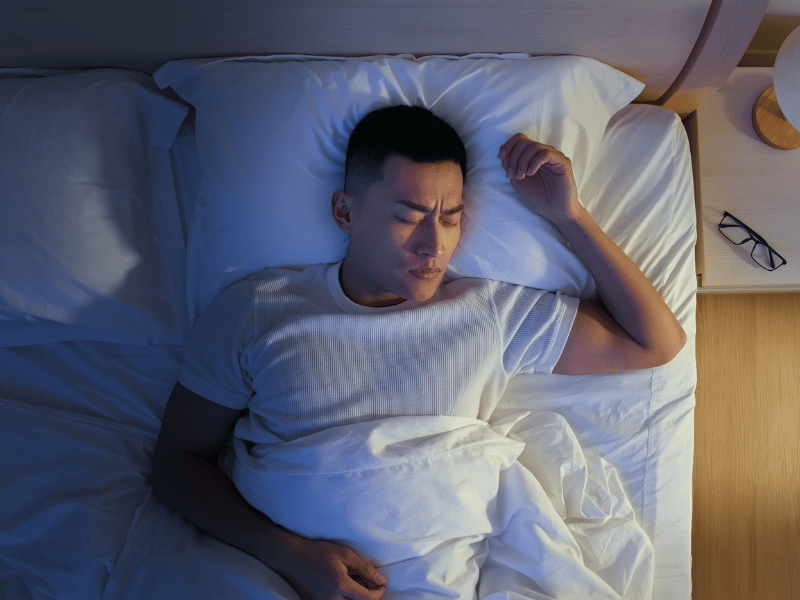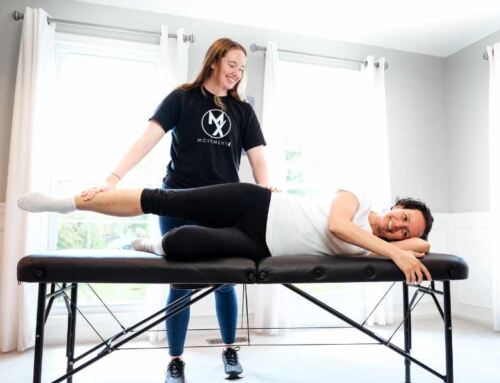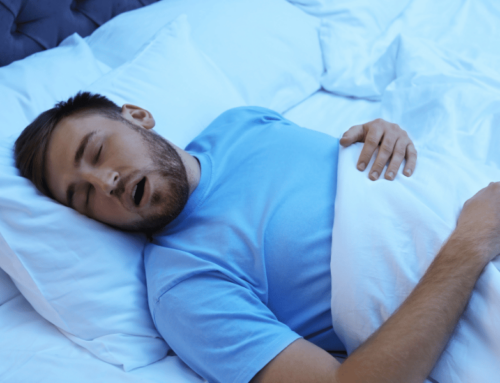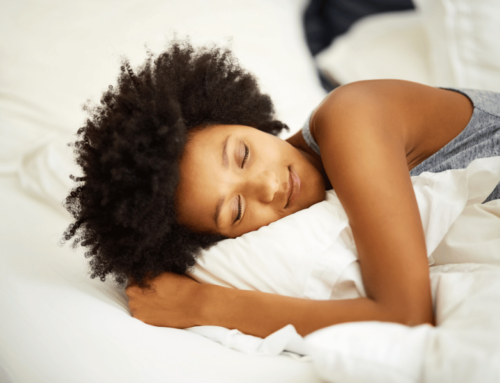Sleep Well, Move Well, Live Well: Why Great Sleep Might Be One of Your Best Physical Therapy Exercises
At MovementX our philosophy is “Move well, live well” and as humans our physical health is one of the most important factors in our ability to live well. When asked what we can do to be healthy and live well most people will regularly (and correctly) suggest things like exercising, eating a healthy diet, and focusing on one’s mental health. However, one thing that they often fail to mention is consistently getting a good night’s sleep.
Great sleep is important at our body’s most basic physiological levels and maintains the health and function of almost all of our body’s systems. Furthermore, poor sleep can undermine all of the other healthy things that we do for ourselves. Getting consistent, high quality sleep is one of the most important things that we can do to maintain our brain and bodily health.
This article is the first in a 3-part series (navigate to Part 2 and Part 3 here) that will explore the importance of sleep to our health with an added focus on musculoskeletal health and get you started on your journey to sleeping well so that you can live well.

What Happens When We Sleep
Many people think that our body “shuts down” when we sleep but that couldn’t be further from the truth. There is a lot going on in our bodies when we sleep. Sleep is a regenerative activity that allows our body to heal and repair itself from the activities of the day. It can help to think of our bodies as a building. Sleep is when the nighttime maintenance crew comes in to fix things that are broken, clean up, and take out the trash. If the maintenance crew doesn’t have the time needed to get its work done, broken things don’t get repaired, the building gets dirtier and dirtier, and the trash starts to accumulate. If this happens repeatedly for long enough the whole building starts to break down. The same is true with our bodies. When we are sleeping a whole host of important things happen:
- Physical restoration: Our body undergoes cellular repair of muscles, bones, and other tissues. This is a critical process to recover from the physical exertion of our daily activities.
- Cognitive processes: Sleep plays an important role in cognitive functions such as memory consolidation, learning, and problem solving. During REM sleep our brains organize new information, strengthen memory, and facilitate learning.
- Psychological restoration: Sleep is hugely important for emotional regulation and mental health. Sleep deprivation or lack of sleep has been associated with heightened emotional response, reduced coping ability, and increased incidence of mood disorders.
- Immune system functions: Sleep enables the production of proteins that help fight infection and inflammation. Without adequate sleep our immune system weakens and we become more susceptible to infection and illness.
- Metabolic functions: Impaired sleep negatively impacts our metabolic function and impairs hormones that regulate hunger and satiety and affect insulin sensitivity.
Without proper sleep our bodies are unable to properly maintain themselves. This results in a ripple effect that can lead to the development of disease processes that impair our body’s ability to function well.
The Consequences of Poor Sleep on General Health
Collectively we do not sleep well. Over one third of Americans don’t get the recommended 7-9 hours of sleep per night and 50-70 million US adults suffer from chronic sleep disorders such as insomnia or sleep apnea [2]. What might be even worse is that many of us wear our lack of sleep like a badge of honor… In reality we’re only hurting ourselves.
Poor sleep, especially when chronic, can contribute to the development of numerous health issues including high blood pressure, obesity, type 2 diabetes, kidney disease, certain cancers, stroke, depression and anxiety, and dementia or other neurodegenerative disorders. Additionally, the general effect of impaired sleep on physical and cognitive function can lead to impaired balance, coordination, and decision making resulting in an increased risk for falls, motor vehicle accidents, and workplace injuries.

The Consequences of Poor Sleep on Musculoskeletal Health
More specifically, if you’re reading this article on the MovementX website you are likely someone who is currently going through or might be considering physical therapy. Did you know that your sleep can have a huge impact on your injury risk, your pain levels, your ability to heal, and the outcome of your PT treatment?
Sleep deprivation can increase a person’s risk for injury by impairing the nervous system’s ability to maintain proper body mechanics and balance. For example, research has found that inadequate sleep in athletes is associated with higher risk of acute musculoskeletal injuries such as sprains, strains, and/or fractures [3]. Inadequate sleep is also linked to reduced muscle repair and tissue regeneration resulting in increased risk of overuse injuries [6].
After musculoskeletal injury, sleep plays a crucial role in the repair of tissues. Poor sleep results in a decrease in growth hormone needed for repair which is predominantly secreted during deep sleep. It can also lead to increased levels of pro-inflammatory cytokines that can prolong inflammation and hinder recovery [5]. Additionally, research has found that those experiencing poor sleep quality report greater levels of pain during the rehab process after musculoskeletal injuries [10].
In cases requiring surgery, not only does poor sleep result in impaired healing and increased inflammation but it is also associated with increased rates of complications and delayed progress with rehabilitation [1]. Since sleep deprivation suppresses the immune system it also increases susceptibility to post-operative infections [9].
Good sleep might be one of the best things that you can do to allow your body to prevent and recover from injury. It will also enhance your recovery by optimizing your endurance and improving your strength. Do yourself and your PT a favor and sleep well.

How Can We Get Better Sleep?
Getting great sleep should be one of the easiest things that you can do to improve your overall health. When it comes to healthy activities most people love to sleep unlike dieting and exercise. That said lasting change will likely require incremental changes that fit into your lifestyle. You don’t want to find yourself doing the sleep version of crash dieting. Below are a few basic introductory tips that will start you on the path to better sleep and in turn better health:
- Focus on quantity and quality: If nothing else, try to get the recommended 7+ hours of sleep for adults on a nightly basis. If you are a teenager or parent of a teen the recommended duration is 8-10 hours and for school-aged kids it is 9-12 hours per night. Once you have the quantity down, focus on quality. Try to minimize the number of disturbances to your sleep. Disturbances can disrupt your sleep cycle and negatively impact the benefits of sleep.
- Implement a sleep hygiene routine: The term sleep hygiene describes changes in your habits, behaviors, and environment that help you get the best sleep possible. These can include avoiding stimulants such as caffeine after a certain time, limiting device use before bed, creating a pre-bedtime routine to relax, and making changes to the environment of your bedroom. Part 2 of this series explores practical sleep hygiene tips and the research supporting them in greater detail.
- Know your body and get screened: It is not uncommon for people to get the right amount of sleep and employ good habits but still feel tired or not well rested. Underlying sleep disorders such as insomnia or sleep apnea can be a barrier to good sleep and may require further medical evaluation and treatment. If this sounds like you, discuss your symptoms and concerns with a member of your healthcare team who can properly assess and evaluate your impairments and connect you with the right specialists to properly address your issues.
Conclusion
We all aspire to feel great and live the lives that we want to live. Do not underestimate the power of sleeping in helping you accomplish that. I hope that this article has fueled your motivation to improve the quality of your sleep. You can stop here or continue your deep dive into sleep by reading Part 2 of this blog series on sleep hygiene and Part 3 on obstructive sleep apnea. We here at MovementX encourage you to continue on your journey to get your best sleep ever so that you can heal well, feel well, move well, and most importantly live well.
References
- Ativan, M. S., & Finkel, M. A. (2014) The role of sleep in post-surgical recovery: Implications for orthopedic rehabilitation. Clinical Orthopaedics and Related Research, 472(2), 532-538. doi:10.1007/s11999-013-3313-4
- Centers for Disease Control and Prevention. Adult Sleep Facts and Statistics. Centers for Disease Control and Prevention. Published May 15, 2024.
- Chtourou, H. & Souissi, N. (2012) The impact of sleep length restriction on daily performances and recovery of athletes. Biology of Sport, 29(4), 197-207. doi:10.5604/20831862.1053325
- Goldstein, A. N., & Walker, M. P. (2014). The role of sleep in emotional brain function. Annual Review of Clinical Psychology, 10, 679-708. https://doi.org/10.1146/annurev-clinpsy-032813-153721
- Haack, M. A., & Mullington, J. M. (2005). Sustained sleep restriction and human immune function. Brain, Behavior, and Immunity, 19(5), 552-560. doi:10.1016/j.bbi.2005.02.003
- Horne, J. A. (2013). Sleep loss and it consequences: Implications for musculoskeletal injury. Journal of Sports Science, 31(13), 1452-1461. doi:10.1080/02640414.2013.787576
- Irwin, M. R. (2015). Sleep and inflammation: Partners in sickness and in health. Nature Reviews Immunology, 16(7), 423-431. https://doi.org/10.1038/nri.2016.48
- Laine, A. M., McLoughlin, K., & Kirwan, M. (2016). The effects of sleep quality on post-surgical rehabilitation. Journal of Orthopedic Research, 34(3), 432-438. doi:10.1002/jor.23114
- Spiegel, K., Leproult, R., & Van Cauter, E. (1999). Impact of sleep debt on metabolic and endocrine function. The Lancet, 354(9188), 1435-1439. https://doi.org/10.1016/S0140-6736(99)01376-8
- Tang, N. K. Y., & Crane, C. (2012) Sleep and pain: The role of sleep in pain and recovery. Current Rheumatology Reports, 14(6), 409-416. doi:10.1007/s11926-012-0284-2
- Tasali, E., & Van Cauter, E. (2006). Sleep and the risk of type 2 diabetes. Current Diabetes Reports, 6(3), 205-210. https://doi.org/10.1007/s11892-006-0049-1
- Walker, M. P. (2017). Sleep and memory: The ongoing debate. Nature Reviews Neuroscience, 18(7), 409-412. https://doi.org/10.1038/nrn.2017.54








